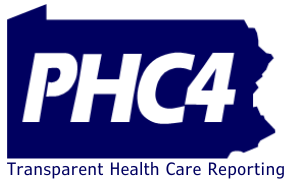Contact: Joe Martin – 717-232-6787
New PHC4 Report Shows Hospital Results for Pediatric Heart Surgery
Harrisburg, PA – June 12, 2019 – The Pennsylvania Health Care Cost Containment Council (PHC4) has released a report on pediatric and congenital heart surgery that shows results for the five children’s hospitals in Pennsylvania and one in Delaware. The report represents one of a few efforts at statewide public reporting on pediatric cardiac surgery outcomes making Pennsylvania a national leader when it comes to improving the health outcomes for children with heart disease. Affecting nearly one out of every 100 infants in the United States, congenital heart defects are the most common birth defect and the leading cause of deaths related to birth defects.
The children’s hospitals included in this report have chosen to voluntarily share their mortality rates for pediatric heart surgery with the public, said Joe Martin, PHC4’s Executive Director, information that is crucial to families facing difficult choices when a child needs one, or more, of these very complex procedures, added Martin.
The report provides the public with volume and risk-adjusted 30-day operative mortality data on ten widely performed heart surgeries, some more complex than others. Nationally, mortality rates for these ten procedures vary widely from less than one percent for repair of a ventricular septal defect to about 15 percent for the Norwood procedure. Results account for differences in patient illness levels, including age, and other complicating conditions.
In addition to data on the individual ten procedures, the report shows the total number of operations performed by each hospital information that can be helpful in understanding a hospital’s overall experience with pediatric and congenital heart surgery. There were 6,696 pediatric and congenital heart surgeries performed among the six children’s hospitals included in the report during the years 2014-2017, the most recent data available to PHC4. The report also looks separately at outcomes for neonatesâinfants less than 31 days old.
The Society of Thoracic Surgeons (STS) provided the data published in this report to PHC4. The children’s hospitals included in this report currently participate in the STS data registry. Believing that transparency and accountability, as provided by public reporting, improves care and helps families of children facing cardiac surgery make informed decisions, surgeons and other hospital representatives joined PHC4 in developing the report. According to Martin, This project is a unique collaboration among PHC4, the Society of Thoracic Surgeons, and the hospitals and surgeons providing care every day for the children who need pediatric heart surgery.
Understanding statistical significance and patient risk factors in the context of this report.
Because hospitals’ mortality rates vary, differences in mortality rates among hospitals should be interpreted carefully. Confidence intervals can assist in understanding these differences. In this report, confidence intervals are used to show the range of mortality rates that are likely to be attributable to simple random variation. Specifically, confidence intervals show whether a hospital’s mortality rate is significantly different (higher or lower) than expected after accounting for the risk of the patient. For example, if one hospital has a relatively low mortality rate and another hospital’s rate is relatively high, BUT the confidence intervals for each facility include the STS rate, then both hospitals have outcomes that are not significantly different than expected after accounting for patient risk levels.
The report is available on PHC4’s website at www.phc4.org. You can also link to it through social media on Facebook and Twitter.
PHC4 is an independent state agency charged with collecting, analyzing and reporting information that can be used to improve the quality and restrain the cost of health care in Pennsylvania.

